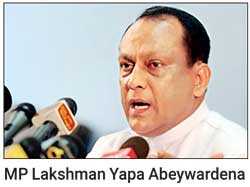Monday Jan 19, 2026
Monday Jan 19, 2026
Saturday, 1 December 2018 02:08 - - {{hitsCtrl.values.hits}}
By Nuwan Senarathna
United People’s Freedom Alliance (UPFA) Parliamentarian Lakshman Yapa Abeywardena yesterday defended policies to reduce taxes, insisting it was a measure to cut down production costs of small-scale industries to achieve long-term development goals.
“Benefits of certain tax policies introduced by the Sirisena-Wickremesinghe Cabinet were gained by large companies. Therefore, small-scale industries couldn’t enjoy a reduction of taxes,” Abeywardena told reporters at the Prime Minister’s Office.
In early November, the Sirisena-Rajapaksa Cabinet announced sweeping tax concessions and slashed prices on fuel, while Special Commodity Levy was to be reduced on dhal by Rs. 5 per kg, chickpeas by Rs. 5 per kg, black gram by Rs. 25 per kg. Customs Duty would also be waived on wheat grain to Rs. 9 per kg from the existing waiver of Rs. 6 per kg. Sugar would be brought under the Special Commodity Levy whereby the applicable taxes on sugar would also be reduced by Rs. 10 per kg.
He said that tax policy consistency was needed to stabilise the economy, which had been one of the weakest areas of the Sirisena-Wickremesinghe Cabinet.
He claimed tax imposed on raw materials had increased the cost for small-scale industries that led to the closure of certain companies by local producers. “Lack of consistency in tax policy had generated various negative impacts on the economy,” he added.
He noted that the Sirisena-Rajapaksa Cabinet would conduct a series of discussions with small-scale industrialists to identify the negative of impacts that arose due to the inconsistency of tax policies in Sri Lanka.
“If we take the tax imposed on sugar, that had negatively affected local producers of ice cream and soft drinks, which increased production cost. Therefore, we have to study these matters to bring consistency.”
Abeywardena also said the stable macroeconomic environment was needed to create an investment-friendly environment in the country to achieve long-term development goals.
He also emphasised that the general election was the best possible way to stabilise the economy. “It doesn’t matter which party has the ability to form a Government. To have a stable economy, a stable Government is what matters,” he added.